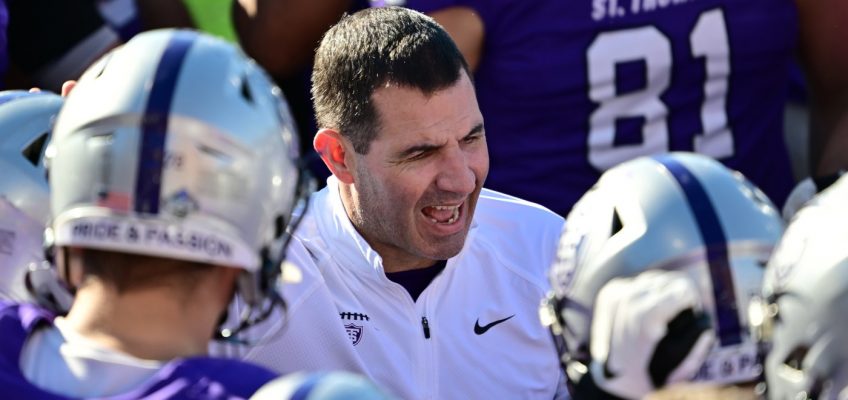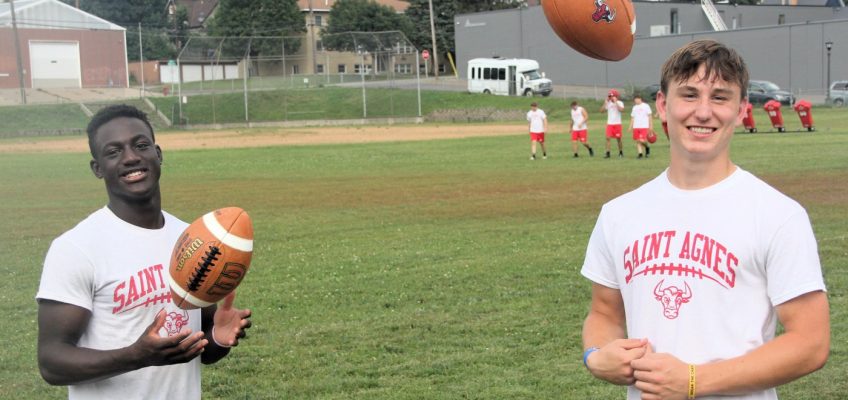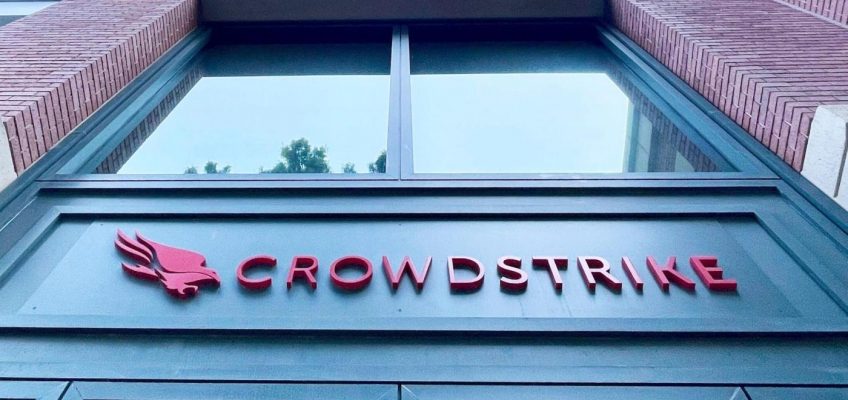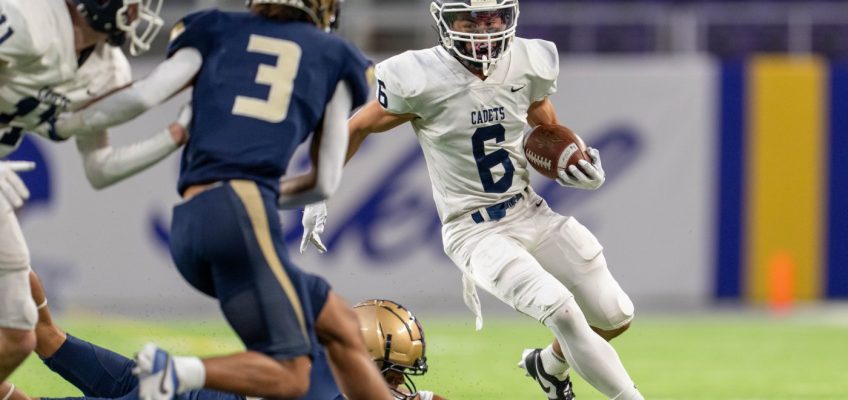Every year, Saint Agnes football does live hitting on Fridays after the acclimation period. The first day in full pads features a 3-on-3 hitting drill featuring two offensive linemen, two defensive linemen, a ball carrier and a linebacker/defensive back.
The first two players in line for the drill are always the Plamann brothers, Danny and Evonson.
The two cannot resist the opportunity to go toe to toe.
“Danny won one year, Evons won the other. Then this year, pretty sure Danny won,” Aggies coach Sam Thompson said. “They love competing against each other.”
He sees that firsthand at practice, as well as in his team sports gym class to kick off each school day. It’s common for the teacher/coach to have to remind the brothers to tone it down a notch.
“We don’t want anybody getting hurt in gym class, but they’re going 100 percent at each other trying to be the best in anything,” Thompson said. “Whether that’s badminton or pickleball or ultimate frisbee.”
That’s how it has been since the boys were little. Danny is a senior this fall at Saint Agnes, and a receiver for the football team, which opens its season at 7 p.m. Friday against Twin Cities Charter at Concordia-St. Paul’s Sea Foam Stadium. Evonson, a junior, is the running back.
Undated courtesy photo of Evonson Plamann (left) and Danny Plamann being thrown into the air as little boys. (Courtesy of Danny Plamann)
The two are separated by almost exactly one year in age. When Danny was 3 years old, Evonson was adopted from Haiti.
They’ve been attached at the hip — and at each other’s throats — ever since.
“They are true brothers,” said their mom, Carol.
EVONSON’S ADOPTION
Danny and Evonson are the youngest of eight siblings.
Dan and Carol Plamann adopted two children from Haiti before Danny was born.
“We just wanted to open our home to somebody who needed it,” Carol said.
At that time, Dan went to Haiti with his parents to visit the orphanage while Carol stayed home with the couple’s four other children.
Years later, Carol wanted to see the orphanage for herself to see where two of her children were from and have that experience. So she visited Haiti on a mission trip along with two of her older children. She walked into Sister of Charity orphanage in Port au Prince.
On the first floor of the facility, ill and malnourished children are nursed back to health. On the second floor were kids waiting to be adopted.
When Carol reached that level, most of the kids quickly approached in search of a hug and a little attention. And then there was Evons.
“He was just kind of sitting off in the distance,” Carol recalled, “and I knew that kid was checking out.”
A sister approached Carol and asked if she’d ever thought about adopting again. While that wasn’t the plan of the trip, Carol admitted she had.
“And she says, ‘I think I know the one you’re supposed to have,’ ” Carol recalled.
Carol pointed at Evons.
“That’s the one,” the sister said.
Carol visited Evons every day throughout the trip and the adoption process was underway. The paperwork was well on its way when disaster struck in Haiti — the massive earthquake of 2010 that rocked the nation.
For a brief period, the Plamanns didn’t know if Evons was OK. Finally, they received news the children at the orphanage were all alive. But conditions were far from ideal. The kids were sleeping outside, with concrete-dust from crumbled buildings infesting the air they were breathing on a daily basis.
A string of fortunate events, combined with diligence from the Plamanns, got Evonson on the final humanitarian flight out of Haiti to Florida, where he was met by Carol.
He had giardia, pneumonia and a number of environmental allergies. Evonson was sick, but he was smiling.
“For me,” Carol said, “the miracle is that he can run.”
ATHLETIC BROTHERS
And, boy, can Evons run. So, too, can Danny. Danny noticed how athletically dominant he and his brother were in second-grade soccer.
“When we were scoring every goal on our team,” he said.
Last fall, Evon ran for 799 yards, gaining 8.2 yards per carry while scoring seven touchdowns. Danny caught in 24 passes for 543 yards and five scores and added nine interceptions on defense for the Aggies, who went 9-1 last season.
Thompson said Danny is “just a super smart, savvy football player.” He chalked up those nine interceptions to the defensive back’s ability to use his instincts to put himself in the perfect positions to make plays.
And Evons has “some lightning-quick speed.”
“For him, he hits a hole, hits a seam and he can turn any type of run into a big play,” Thompson said, “which we certainly love.”
Carol witnessed that speed up close and personal when Evons was in second grade and his mother tried to give her little boy a timeout.
“I did something bad,” Evons said. “But I don’t remember what I did.”
They never do.
You can witness the moment when Carol realized Evons, despite what he endured as an infant, was far from fragile playing out in a video taken by Evons’ then-teenaged older sister Carol chasing Evons around the yard, to no avail.
“I couldn’t catch him,” Carol said. “My husband came home and I was like, ‘Dan, Evons is outside, he’s supposed to be taking a timeout — can you get him?’ ”
“Then I was running away from my dad, running away from every person that was chasing me,” Evons said. “And then I just hid outside for like three hours and came back late at night.”
Did he get out of the timeout?
“No,” Evons said.
They never do.
Eight kids created what Danny said could often be a “real chaotic” scene at the Plamann household. Everyone was in sports and activities, and Danny and Evons followed suit. Danny believes that environment is a big reason why the boys are so athletic.
The two grew up outside. Carol said they preferred that versus watching TV.
“Most kids nowadays will be inside playing video games or just sitting around,” Danny said. “We were never like that.”
No video games?
“We used to play,” Danny said, “until our mom took aways our console.”
“And after that, we haven’t had anything,” Evonson said.
So outside it was — a far more enjoyable reality when you have a constant running mate.
RIVALS, BROTHERS, BEST FRIENDS
Carol jokes she never had to sign her youngest sons up for AAU. There was plenty of competition to be found in the driveway.
“They just played 1 on 1, whatever it was,” she said. “They’d play basketball in the driveway a million times, then they’d throw the football back and forth a million times, and then they’d pitch to each other and see who could strike out the other guy more. It worked out really well for their sports, I’ll tell ya that.”
Thompson is sure that bred the competitive edge present in both boys. Carol noted even when they were on separate basketball teams as kids, they would compete to see who could score the most points.
“It definitely pushes you to be better when you’re always striving to be better than the next kid,” Danny said. “If I do something better than Evons, he’s always going to do better than me. And then if I do better than him, it just stacks levels.”
Now, as teammates, they’re competing alongside one another. Danny is happy when Evons succeeds, because that’s his team’s running back, but he’s usually reminded that a key block was thrown to make the play work.
Evons said if he played receiver, he’d fare well. But if Danny was a running back, it may not go as great. It never ends.
The two cultivated a perfect “love-hate” relationship. Danny noted the competitiveness produced a few fights over the years, but they rarely lasted longer than five minutes. Then it was back outside to play more.
Rivals, but also best friends. They share so many of the same interests and friends. If Danny and his senior friends go out for a meal, Evons is invited. Danny drives everywhere, with Evons riding shotgun.
“They prefer to do things together,” Carol said. “They’re always Dan and Evons. You always put the two together.”
For one more year, anyway. They’ll share the football and basketball seasons together as teammates, before Danny does baseball in the spring, while Evons does track and field. Then, Danny will go off to college.
That thought has Carol “a little sad.”
“I feel very, very blessed to have both of them, and to watch them both has been beyond fun. I’m just really happy,” she said of watching the brothers grow up together. “I wouldn’t trade it for anything.”
Danny noted this final football season is “a little bittersweet.”
“I’m just grateful I had the opportunity with my brother,” Danny said. “It’s nice that God put someone in my life to make me better and allowed me to do sports with him, grow close with him and have a nice relationship.”
Added Evons: “He’s helped me get better at things.”
Danny looked over at his brother.
“That’s all?” he asked.
“Yeah, you said a love-hate relationship!” Evons said with a laugh. “I can’t explain more!”
High School Football: Week 1 Thursday predictions
High School Football: Preseason Prep Bowl predictions
Though retired from TV, Randy Shaver is still on the high school football beat
High school football: After breakthrough 2023 campaign, Two Rivers confident in its pursuit for more
High school football: After years of struggles, Roseville aims to continue the climb




